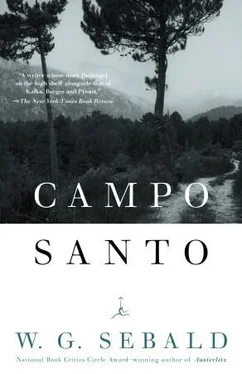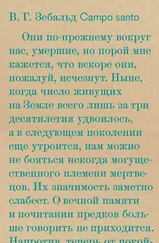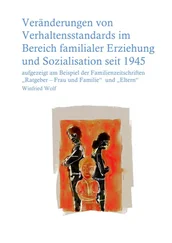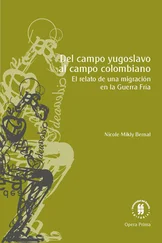catches him. Ears pricked; he
listens. For him — there is no time
to rest. Run runs runs. Poor hare!)
The ambivalent nature of the hare in myth, closely combining power and impotence, boldness and fear, determines Herbeck’s concept of the nature of his emblematic animal.
In his autobiographical essay, he also tells us (as Gisela Steinlechner, too, has pointed out) that his mother “had a hare” at what the author calls a time of revolt and the “need for silver.” By saying that she had a hare (einen Hasen bekam) he means, of course, that she “was brought or given” a hare, a useful addition to the meager diet of the times. The brief phrase used by Herbeck, however, suggests that his mother “had a hare” as a woman might have a baby.
This hare is then killed by his mother in his father’s presence, and after that skinned. Herbeck does not mention the dish of roast hare itself, but adds at the close of his account of the incident only the confession “It tasted too good to me,” which in a few words sums up the moral of the whole story. The true extent of his involvement in the dark machinations of social life is that he was involved in the joint family crime not just as victim but as perpetrator, having helped to consume his likeness and namesake. To those who can understand it, the legend of the poor hare used by Herbeck to explain his sad fate is an exemplary tale of suffering. “The greater the suffering,” he once wrote, “the greater the poet. The harder the work. The deeper the meaning.”
To the Brothel by Way of Switzerland: On Kafka’s Travel Diaries
A Dutch acquaintance recently told me how she traveled last winter from Prague to Nuremberg. During the journey she was reading Kafka’s travel diaries, and sometimes spent a long time looking out at the snowflakes driven past the window of the old-fashioned dining car, which with its ruffled curtains and little table lamp spreading reddish light reminded her of the windows of a small Bohemian brothel. All that she remembered from her reading was the passage where Kafka describes one of his fellow travelers cleaning his teeth with the corner of a visiting card, and she remembered that not because the description was particularly remarkable, but because no sooner had she turned a few pages than a strikingly stout man sitting at the table next to hers also, and not a little to her alarm, began probing between his own teeth with a visiting card, apparently without any inhibitions at all. This story made me return, after I had not looked at them for a long time, to the notes that Kafka made when he and Max Brod traveled from Prague to Paris by way of Switzerland and northern Italy in August and September 1911. Much of that account is as real to me as if I myself had been there, and not just because “Max” is so frequently mentioned, for instance when a lady’s hat falls on him in the train compartment, or when Franz leaves him alone “sitting over a grenadine by himself in the darkness on the outskirts of a half-empty open-air café”; no, in a curious way the stages of that summer trip of the past taken by the two bachelors are more familiar to me than any other place at a later date. Even the car drive in the rain through Munich by night—“The tires make a rushing noise on the asphalt, like the whirr of a cinema projector”—bring back great tracts of the memory of my first real journey, taken in 1948, when I and my father, who had just returned from a POW camp, went from W. to visit my grandparents in Plattling. My mother had made me a green jacket, and a little rucksack of check fabric. I think we traveled in a third-class compartment. At Munich station, where you could see huge mounds of rubble and ruins as you stood in the forecourt, I felt unwell and had to throw up in one of those “cabins” of which Kafka writes that he and Max washed their hands and faces in them before boarding the night train which passed through the dark foothills of the Alps by way of Kaufering, Buchloe, Kaufbeuren, Kempten, and Immenstadt to Lindau, where there was a great deal of singing on the platform long after midnight, a situation I know very well, since there are always a number of drunks at Lindau station who have been out on excursions. Similarly, the “impression of separate buildings standing very upright in St. Gall, without being part of a street,” but running along the slopes of the valley like one of Schiele’s Krumau pictures, accurately corresponds to the scenery of a place where I lived for a year. In general, Kafka’s comments on the Swiss landscape, the “dark, hilly, wooded banks of Lake Zug” (and how often he writes of such things) remind me of my own childhood expeditions to Switzerland, for instance a day trip we made by bus in 1952 from S. to Bregenz, St. Gall, and Zürich, along the Walensee, through the Rhine valley and home again. At the time there were comparatively few cars around in Switzerland, and because many of those were American limousines — Chevrolets, Pontiacs, and Oldsmobiles — I really thought we were in some entirely foreign, quasi-utopian country, rather as Kafka found himself thinking of Captain Nemo and A Journey Through Planetary Space when he saw a revenue cutter on Lago Maggiore.
In Milan, where I had some strange adventures fifteen years ago, Max and Franz (one almost envisages them as a couple invented by Franz himself) decided to go on to Paris, since cholera had broken out in Italy. At a coffee-house table in the cathedral square, they discuss apparent death and shooting pains in the region of the heart — obviously a particular obsession in the now sclerotic Habsburg empire, which had been suspended in a kind of afterlife for decades. Mahler, notes Kafka, had expected those pains in the heart too. He had died only a few months earlier, on May 18, at the Löw Sanatorium as a thunderstorm broke over the town, just as there was a thunderstorm on the day of Beethoven’s death.
Open in front of me now I have a recently published album containing photographs of Mahler. He is sitting on the deck of an oceangoing liner, walking in the countryside near his house in Toblach, on the beach in Zandvoort, asking a passerby the way in Rome. He looks to me very small, rather like the impresario of a touring theatrical company down on its luck. In fact, the passages of his music I like best are those where you can still hear the Jewish village musicians playing in the distance. Not so long ago I was listening to some Lithuanian buskers in the pedestrian zone of a north German town, and their music sounded exactly the same. One had an accordion, another a battered tuba, the third a double bass. As I listened, hardly able to tear myself away, I understood why Wiesengrund once wrote of Mahler that his music was the cardiogram of a breaking heart.
The friends spent their few days in Paris in a rather melancholy mood, going on several sightseeing expeditions and searching for the joys of love in a “rationally furnished” brothel with “an electric bell,” where the business was conducted so swiftly that you were out in the street again before you knew it. “It is difficult,” writes Kafka, “to see the girls there very closely.… I really remember only the one who was standing straight in front of me. She had gaps in her teeth, stood very upright, held her dress together with her clenched fist over her pudenda, and rapidly opened and closed her large eyes and her large mouth. Her blond hair was untidy. She was thin. Felt afraid of forgetting to keep my hat on. You positively have to wrench your hand away from the brim.” Even the brothel has its own social standards. “A long, lonely, pointless way home,” the note concludes. Max returns to Prague on September 14. Kafka spends another week in the sanatorium at the natural spa of Erlenbach in Zürich. “Traveled with a Jewish goldsmith from Krakow,” he writes after arriving. Kafka must have met this young man, who had already traveled widely, on the way back from Paris to Zürich. He mentions that getting out of the train the goldsmith carries his small suitcase like a heavy burden. “He has,” writes Kafka, “long, curly hair through which he occasionally runs his fingers, a bright gleam in his eyes, a slightly hooked nose, hollow cheeks, a suit of American cut, a frayed shirt, socks falling down over his shoes.” A traveling journeyman — what had he been doing in Switzerland? Kafka, we are told, took another walk that first evening in the dark little garden of the sanatorium, and next day there were “morning gymnastic exercises to the sound of a song from Des Knaben Wunderhorn played by someone on the cornet.”
Читать дальше












